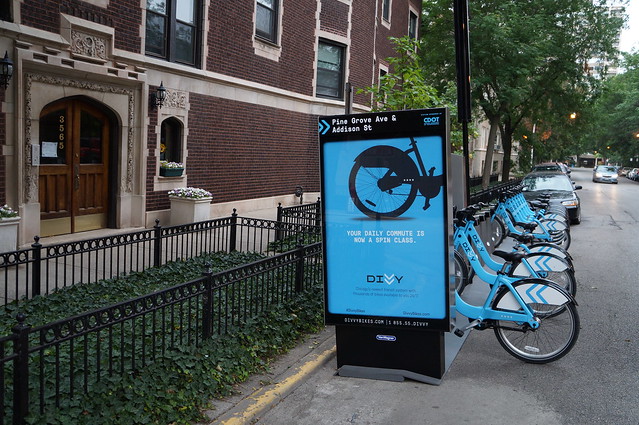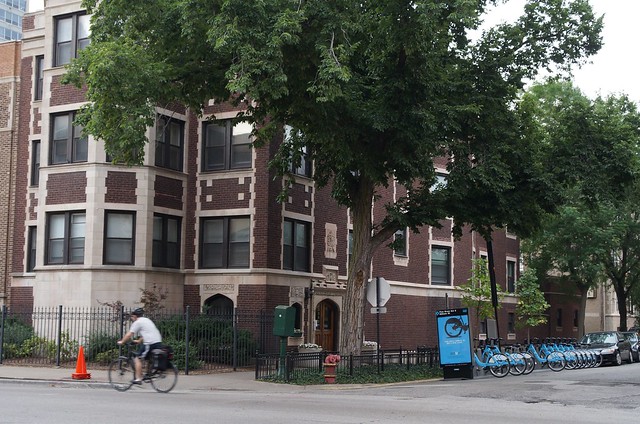Update Friday, 15:09: Judge Kathleen Kennedy denied the plaintiffs' request for a temporary restraining order because they didn't state a clearly ascertainable, protectable right and cannot sustain the merits of their complaint (if it went to trial, as they requested). The protectable rights they tried to ascertain and state were that the Divvy station would have a negative impact on the building's property value, and the residents' safety and privacy would be at risk.
Chicago's Second City nickname comes from the old accusation that we're constantly aping the Big Apple. Regardless, we're definitely following in New York's footsteps when it comes to bike-share NIMBYism. After NYC installed 300 Citi Bike stations within a few weeks this spring, a number of condo associations hired lawyers and threatened to sue the city after stations were placed in front of their buildings. At least one association actually filed a lawsuit, which was almost immediately thrown out. Opposition died down after 65,000 members pedaled over two million miles within two and a half months. Many other bike-share cities have seen resistance to the docking station from homeowners, but stations have worked out just fine in historic residential streets in London, Washington, D.C., and Boston.
So let's chalk it up as a rite of passage that Chicago is now seeing its first anti-bike-share lawsuit. On Wednesday, a Lakeview condo association filed suit against the Chicago Department of Transportation and 46th Ward Alderman James Cappleman in an effort to get a Divvy docking station removed from the front of a three-unit building at 3565 North Pine Grove, on the southeast corner of Pine Grove and Addison Street. Workers installed the station yesterday afternoon, it went online at 3:13 p.m. and saw its first use at 4:19 p.m. However, before the installation was complete, association members and married couple David Kolin and Jeannine Cordero, both lawyers, had already filed the lawsuit.
Why? Kolin told the Sun-Times the condo owners object because the station is five steps from the front door, and they think it will attract strangers to the block who will might follow residents' children into the building. In the Tribune, Cordero called the station "hideous," calling to mind Wall Street Journal editorial board member Dorothy Rabinowitz's famous rant against Citi Bike stations "begriming" the streets of New York. Kolin and Cordero are kidding, right? The 50 people who had used the Pine Grove station by 9:30 this morning would probably argue that it's in a handy location.
The condo association's lawsuit [PDF] says building residents found out about the station on Tuesday when they spoke to a Divvy staffer setting up traffic cones. The lawsuit states that the station will "[destroy] thousands of dollars of improvements made by the residents," arguing that the parkway upgrades they paid for would be destroyed by rampaging bike-share customers. It's silly to predict that the local residents who'll be using using this station to commute, run errands, or go for lakefront cruises will be stomping on the parkway plantings or dropping Big Gulp containers in the bushes.

The condo owners give the city amusing directions about where Divvy stations should be placed, arguing that they "should be installed in a higher trafficked area, near public transportation lines and not on a quiet, residential street seeking to retain some calm in an already busy area." The residents must be unaware that they live on bustling Addison Street, which sees 10,000 cars and 150 buses each day and sits four blocks east of the Red Line's Addison stop, not to mention Wrigley Field. Then there's the fact that the whole point of bike-share is to connect residents to jobs, shopping, and other destinations. If you don't put bike-share where people live, the system doesn't work.
"This residential street location was determined to be the safest for customers near the busy intersection of Addison and Lake Shore Drive," CDOT Spokesman Pete Scales told the Trib. "It is located in the public way, close to the curb on the street, and not on any private property."
The lawsuit also claims that "already scarce parking" has been further diminished, but the station replaced only two parking spaces. That public space has become ultimately more productive, since it will enable dozens of people to use the bikes each day instead of simply warehousing a couple of cars.
The plaintiff's request for redress is absurd. They ask for the removal of the station, allowing the condo association to dictate the new location, plus compensatory damages and reimbursement for legal fees. Oh, and they also demand a trial by jury. We may see more of this kind of Divvy NIMBYism in the near future, but once more people wrap their heads around how useful the system is, they'll be begging to have docking stations installed in front of their homes. As a matter of fact, dozens of Craigslist apartment listings have already advertised proximity to Divvy as an asset.





